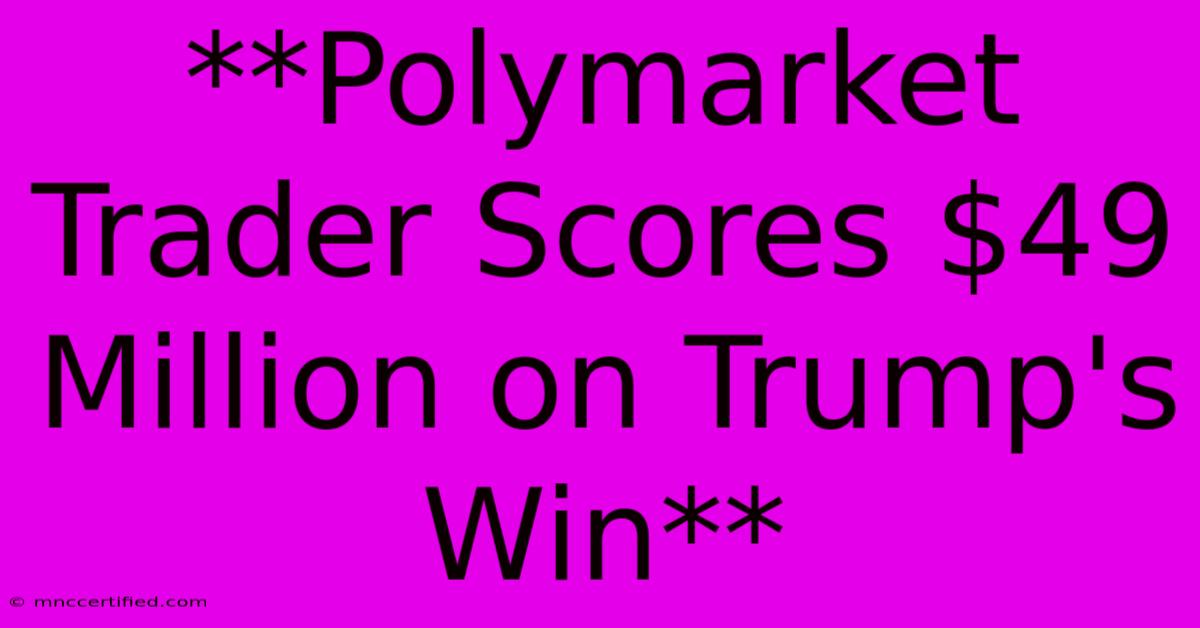**Polymarket Trader Scores $49 Million On Trump's Win**

Table of Contents
Polymarket Trader Scores $49 Million on Trump's Win: A Case Study in Prediction Markets
The 2016 US Presidential election was a shock to many, but for one trader on the prediction market platform Polymarket, it was a golden opportunity. This anonymous trader, who has become known as "The Polymarket Whale," made a staggering $49 million by correctly predicting Donald Trump's victory. This remarkable success story highlights both the potential and risks associated with prediction markets.
Understanding Prediction Markets
Prediction markets are online platforms where users can buy and sell contracts based on the outcome of future events. These contracts pay out depending on the event's result, making them a form of speculative investment. They function on the principle of "wisdom of the crowd," where the collective knowledge and insights of many participants are aggregated to produce accurate predictions.
Polymarket, one of the leading prediction markets, allows users to bet on a wide range of events, from political elections to the performance of companies. Users can express their beliefs about the outcome of an event by buying or selling "shares" that represent the probability of that outcome. If the prediction is correct, they receive a payout proportional to their investment and the final probability of the outcome.
The Polymarket Whale's Strategy
The Polymarket Whale's success story hinges on a combination of factors:
- Early Entry: The trader entered the market early, long before the election cycle heated up. This allowed them to purchase contracts at a lower price, potentially maximizing their potential returns.
- Contrarian Approach: The trader seemingly went against the prevailing sentiment, betting on a Trump win when polls and experts largely favored Hillary Clinton. This bold move, if based on accurate analysis and insights, would have yielded significant rewards.
- Market Knowledge: The trader likely had a deep understanding of prediction markets, knowing how to exploit price discrepancies and market inefficiencies.
Implications and Considerations
The Polymarket Whale's story raises important questions about the power of prediction markets and the potential for massive financial gains. It also highlights the need for:
- Transparency and Accountability: Prediction markets, especially those involving significant sums of money, require transparency and accountability. Regulatory frameworks are being developed to address concerns about market manipulation, insider trading, and other potential risks.
- Responsible Use: The story serves as a reminder that prediction markets are not foolproof and can be highly volatile. It's crucial to approach them with caution and engage in responsible investment practices.
- Understanding the Underlying Data: While the "wisdom of the crowd" can be powerful, it's essential to critically analyze the data and information available. Prediction markets are not infallible, and relying solely on market sentiment can lead to significant losses.
Conclusion
The Polymarket Whale's $49 million win is an extraordinary example of the potential for profit in prediction markets. However, it's important to remember that success in these markets requires a deep understanding of market dynamics, careful analysis, and a tolerance for risk. While prediction markets can provide valuable insights into future events, they should be approached with a responsible and informed mindset.
Keywords: Polymarket, prediction market, prediction markets, Donald Trump, 2016 election, trader, whale, wisdom of the crowd, speculative investment, market volatility, market manipulation, regulatory frameworks, responsible investment, data analysis, market sentiment

Thank you for visiting our website wich cover about **Polymarket Trader Scores $49 Million On Trump's Win** . We hope the information provided has been useful to you. Feel free to contact us if you have any questions or need further assistance. See you next time and dont miss to bookmark.
Featured Posts
-
Golden State Mutual Life Insurance Company
Nov 07, 2024
-
Wisconsin Legislature Republicans Lead Voting Dynamics
Nov 07, 2024
-
Arsenals Hopes Rest On Odegaards Shoulders
Nov 07, 2024
-
An Insured Purchased An Insurance Policy 5
Nov 07, 2024
-
Grand View University 2024 25 Costs
Nov 07, 2024